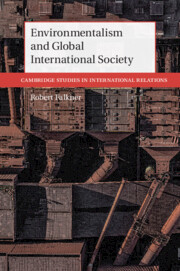Book contents
- Environmentalism and Global International Society
- Cambridge Studies in International Relations: 156
- Environmentalism and Global International Society
- Copyright page
- Dedication
- Contents
- Acknowledgements
- Abbreviations
- 1 Introduction
- Part I Theory
- 2 English School Theory and Global Environmental Politics
- 3 The Idea of Environmentalism
- Part II History
- Part III Analytical Perspectives
- Part IV Conclusions
- References
- Index
- Cambridge Studies in International Relations
3 - The Idea of Environmentalism
from Part I - Theory
Published online by Cambridge University Press: 03 August 2021
- Environmentalism and Global International Society
- Cambridge Studies in International Relations: 156
- Environmentalism and Global International Society
- Copyright page
- Dedication
- Contents
- Acknowledgements
- Abbreviations
- 1 Introduction
- Part I Theory
- 2 English School Theory and Global Environmental Politics
- 3 The Idea of Environmentalism
- Part II History
- Part III Analytical Perspectives
- Part IV Conclusions
- References
- Index
- Cambridge Studies in International Relations
Summary
The first part of Chapter 3 introduces the diverse roots of environmental thinking and identifies the normative core around which modern environmentalism is built. It traces the evolution of different strands of environmentalism and outlines the main debates that have shaped the evolution of environmental thinking and activism since the nineteenth century. The second part of this chapter identifies the different ways in which environmental ideas can be applied to the international realm. Employing the English School’s conceptual dyads of pluralism/solidarism and international/world society, it identifies four ideal types of how a green global order can be created: ‘Green Westphalia’ and ‘global environmental governance’, representing the pluralist and solidarist variants of a green international society; and ‘eco-localism’ and ‘eco-globalism’ as the pluralist and solidarist versions of a green world society.
Keywords
- Type
- Chapter
- Information
- Environmentalism and Global International Society , pp. 45 - 80Publisher: Cambridge University PressPrint publication year: 2021
- 1
- Cited by

